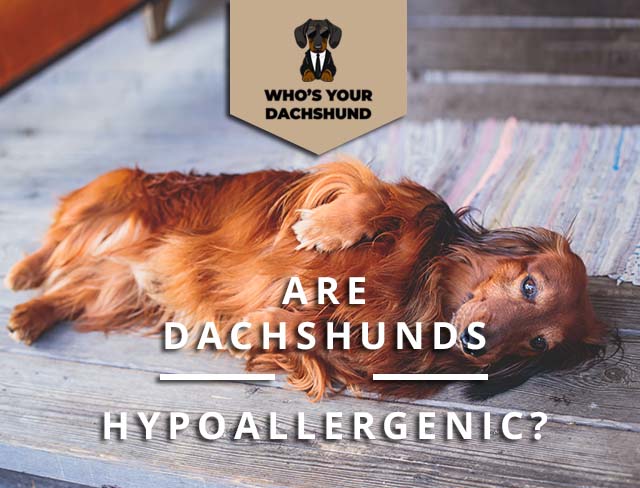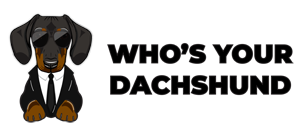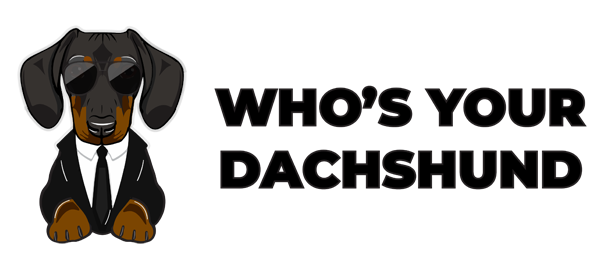
Dachshunds are not hypoallergenic. For one thing, they shed a lot of hair regardless of the type. Secondly, they have a higher-than-average likelihood of producing an allergic condition.
The Truth About Dachshund Shedding and Hypoallergenic Claims
As a breed, dachshunds shed about the same amount of hair as most other dog breeds. But the excessive shedding that makes them uncomfortable to live with is part of what makes them so hypoallergenic. And it’s not just their hair they shed. It’s also human hair, anything else that might be in their environment. You’ll find their sheds on your clothes and furniture, on your floors and carpets, but you’ll also find them in the air around you.
It’s All About Dachshund Hair and Your Allergies
Studies show that around 90% of people who own a dachshund report having no allergic reactions to their hair or dander, versus 30% for dogs in general. Dachshunds also have shorter and thinner hair than most dogs and, therefore less likely to trigger an allergic reaction. However, with so many different kinds of coat type and dander proteins found in their skin oil, not all humans can tolerate it. If you have allergies, it is vital to ensure your dog is kept completely clean and neat, no matter what type of dog you own.
Allergy Caused by Dogs
A dog allergy is an allergic reaction to exposure to a canine’s dander and saliva. Allergy caused by dogs, also known as Canine Allergy, can be triggered by bites or scratches, contact with saliva through licking, and close contact with the dog.
- If the allergen is inhaled, it can trigger respiratory tract symptoms such as a runny nose, sneezing, or wheezing. Allergy caused by dogs can also cause skin symptoms such as dermatitis and eczema.
- Allergy caused by dogs can be long-term and often permanent. In some cases, a dog allergy is hereditary, but the most common causes of dog allergies are a series of reactions to flea bites over time. Allergy caused by dogs may also stem from indoor allergies triggered when people with indoor allergies become accustomed to an outdoor pet or start living with a pet for the first time.
What Is Hypoallergenic?
Hypoallergenic refers to products or substances that do not contain as much as one percent of allergens. The term is misused when referring to allergy-causing substances, such as dust mites or pet dander. That’s because the name is thought to refer to low-allergy substances.
Hypoallergenic refers to something else entirely: genetic traits that make certain breeds of dogs and cats less likely than others to trigger humans’ reactions. In other words, it describes species that produce fewer allergens than other animals with the same type of dander (skin cells).
How to Minimize Your Allergic Reaction to Your Dachshund
Wire-haired Dachshunds are among the most common breeds of dogs that develop allergies. They can cause a variety of reactions, including red, itchy skin. In addition to an allergic reaction to the Dachshund, you may also have an allergy to your dog, causing potential harm. Here are some easy tips to reduce or eliminate allergies.
- Keep your dog bathed and brushed. Neglected long-haired dogs will develop an unpleasant odor much more than well-cared dogs.
- Please limit the number of chemicals in their food and treats. These can also cause allergic reactions, so stick to natural treats with little to no chemicals in them. Try to find food made in the United States as well, as many foreign foods contain unnecessary additives that can be harmful, even if they’re not causing an allergic reaction.
- If you or a family member is allergic to your Dachshund, it’s suggested that you keep him outside. It will help limit the contact with allergens and even alleviate an allergic reaction if you have one.
- Keep him away from cigarettes. The dog will smell like smoke, which will cause your allergies to get worse.
- Keep your dog’s nails trimmed. Long nails can also be a food allergen that gets stuck in pillows and blankets and causes an allergic reaction when you inhale it while sleeping at home.
- Make sure that no other dogs are sharing your home. Even if you’re not allergic to your dog, you can develop an allergy from him to another dog in the house.
- If none of these things work, consider getting one that has not been exposed to any allergens that might make you react worse than is necessary for a standard dachshund. You can read about hypoallergenic breeds online if that interests you.
It’s essential to keep your smooth-haired Dachshund clean and well-groomed for both health reasons and allergic reaction reasons.
Which Dogs Are Hypoallergenic? These Breeds Come Close
There are many breeds of dogs considered “hypoallergenic,” meaning they won’t trigger allergic reactions in people prone to them. These breeds come close: poodles, Bichon Frise, Miniature Schnauzers, Shetland Sheepdogs, and Corgis. These dogs cause fewer allergic reactions than others because they don’t shed as much and have less dander. Dander is a type of allergen found in fur, and people can be allergic to it.
Dachshunds and Allergies
According to some studies, dachshunds can cause allergic reactions in some people, but not as severe as cats or dogs do because their fur is less likely to contact human membranes like the eyes and mouth.
So whether or not a dachshund causes allergies depends mostly on how it is kept, which is why people with allergies should entirely avoid interactions with other dogs and cats.
Pros and Cons with Dachshunds
The pros and cons of owning a dachshund depends on how you care and nurture them. As a rule, most dachshunds are non-shedding dogs. However, the long-haired variety can and will require regular grooming and brushing to keep their fur free of mats and tangles. Proper brushing can be a real workout for both the owner and the dog.
However, the short-haired variety is an excellent choice for families with allergies. Because they have a smooth, short outer coat and no undercoat, dachshunds don’t cause the same allergic reactions as many other dogs’ breeds. The American Kennel Club says that dachshunds are the least likely breed to cause allergic reactions. They can be considered one of the best hypoallergenic dog breeds.
Are Dachshunds Hypoallergenic Dogs? Advice If You Are Allergic
The American Kennel Club says there are three types of dog dander. Some people are allergic to all three. Therefore, it’s hard to say whether one breed causes allergy more than the other.
There are two types of dog allergies: nonspecific and atopic.
Nonspecific
The first type is caused by an overreaction from your body’s immune system when it comes into contact with substances that it believes will cause an infection or harm. It causes sneezing, wheezing, and itching, which results in having watery eyes and irritated sinuses. Any dog breed or mixed-breed dog can trigger this type of allergy.
Atopic
The second type is more specific, and it’s caused by a protein produced by a dog’s body. People who have this allergy tend to be allergic to certain dog breeds.
To determine if you have this type of allergy, your doctor will likely do a skin test first, which involves placing a small amount of the allergen (the protein) on your skin to see how your body will react. If you are allergic to this protein, your skin will turn red and become itchy. It typically happens within twenty minutes.
What Causes Your Allergic Reaction From Dogs?
The dander that most people are allergic to is the fur that gets released when the dog grooms itself.
Dealing with your dog’s grooming habits will help control dander levels. That means using a quality brush and comb to control shedding and using anti-dandruff shampoo for treatment. The saliva and bacteria found on dogs’ skin (and at their mouth) are another cause of allergies.
A hypoallergenic dog produces less of the major protein that causes allergic reactions, thanks to their breeding and lack of long hair. It can be said that the longer your pet’s fur, the more allergy-causing proteins it produces.
Are dogs with shorter coats less allergy-causing?
People with allergies are often told that dogs with short coats are less likely to trigger their allergy symptoms. The theory is that the shorter hairs trap less of the dog’s natural body oils, which in turn release fewer allergens around the house, reducing the chances that someone with allergies who shares a home with a dog will suffer symptoms.
Are Dachshunds Hypoallergenic or not?
The Dachshund is not hypoallergenic, but this does not mean that you cannot have them as pets. It just means that you need to take special care of them. Some owners even claim they have allergies but will still keep their Dachshunds.
People with allergies should adopt a Dachshund, but they should use hypoallergenic shampoo, wash their hands thoroughly every time they handle them, and make sure that the dog never touches their bedding.
How to deal with dog allergies
Dealing with dog allergies can be challenging, but it doesn’t have to be. If you know what triggers your allergies and what is safe for your specific allergies, you can take measures to ease your allergy symptoms. For starters, if you have been prescribed an allergy pill, take it. Medicines can help alleviate the severity of symptoms.
- Try not to do too much in one day. Although you may want to visit the park or do some shopping, this can be stressful on your body. Try to space things out over the week instead of doing everything in one day.
- Take an allergy pill before bed, and then use a HEPA filter in your bedroom at night to trap any dust that floats through the air.
- Talk to your dog’s veterinarian about bringing him inside, especially if you have noticed any skin problems developing. Pets can carry pollen and other allergens on their fur and paws to track into the house. If they stay outside, you are also more likely to be around them (and their dander).
Best Way to Clean Dog Hair For Good
These are some tips for getting rid of dog hair for good from furniture, carpets, and clothes:
Dog Hair Reduction Tips
There are some easy ways to stop dog hair from taking over your home. Most of them involve conditioning your dog not to react when you touch its coat. That way, he doesn’t associate petting and brushing with discomfort. Brush him as often as possible and use treats or praise to reward him for being still long enough for you to touch. We recommend that you also teach your dog how to sit so you can reach his belly and legs without getting on your hands and knees or kneeling on the floor.
Vacuum Regularly
It’s important to vacuum often to keep dog hair from spreading. A good rule of thumb is vacuum every week, or at least four times a month. Professional carpet cleaning is recommended every 1-2 years. If you have hardwoods, laminate floors, or tile floors in your house, be sure to sweep them as well as mop the floor weekly (as opposed to daily). Using a mop with a long handle will save your back and get the job done faster!
Replacement Bedding
If you allow your puppy to get on your furniture or sleep in your bed, you should have two sets of bedding for every piece of furniture that he is allowed to use. That way, if he gets hair on one bedding, you can wash it while the other set is being used for sitting.
Use the Right Vacuum For You
Many dog-specific vacuum cleaners are available these days, and some even come with unique features such as a pet hair attachment or rubber wheels to protect hardwood floors.
Use a Wet Mop
Using a wet mop will make clean up easy! Just put some water and your favorite cleaner in the bucket, and then use the mop for mopping the floor. The moisture will help loosen pet hair and dirt, making it easier to remove than a standard broom.
Remove Pet Hair Before It’s Too Late!
Remove pet hair as soon as it lands on clothes and furniture with a lint roller or sticky roller because it can be hard to get off once it has been embedded in fabric or carpet fibers.
Wash Your Dog Regularly
Pets need bathing at least once a month, if not more often. The more often you bathe your dog, the less it will shed at any given time. And remember to brush your dig immediately after washing to help remove loose hair from its coat!
Don’t Forget About Your Other Pets!
If you have pets other than your Dachshund, be sure to give them regular baths since they shed the same furs as your Dachshund. Keeping their bedding clean is also crucial since they shed quite a bit on their beds.
Best Practices for Allergies
The best practices for allergies include:
- Avoiding or minimizing exposure to the allergen (e.g., pollen, animal dander, dust mites)
- Keeping your home clean and free from allergens
- Maintain your dog’s good overall health and hygiene.
- Taking allergenic medications as prescribed
- You should consult a doctor for allergen avoidance.
There is no guarantee that a dachshund will not cause an allergic reaction.
Nourish Your Dachshund
Nourish your Dachshund with the best and most nutritious dog food for their size. Dachshunds are a small breed of dog and need to be fed accordingly. Ensure you provide them a healthy diet with every meal and keep the right balance in the vitamins and minerals they consume.
It is vital to ensure that your dog gets enough water per day. Water keeps their body healthy and helps them stay hydrated throughout the day. Dachshunds have short coats, so they don’t need to be bathed and washed very often. However, you can keep their coats clean by brushing them out every week or so.
Dachshund Hypoallergenic Overview
Since dachshunds are not hypoallergenic, you can still have reactions to them if your allergies are severe. It is just one factor to keep in mind when owning a dachshund. If you’re allergic to dogs, the chances are good that you’ll be allergic to any dog breed.
However, there is some hope if you’re thinking about having dachshund dogs in your home. Not only is their hair similar, but they produce less allergy-causing saliva than do other types of dogs. It means that you’re less likely to have reactions due to saliva than you might with other breeds.
You may think that you’re suffering from allergies because your dog is shedding. However, allergic contact dermatitis is more common in people who own dogs or cats.

